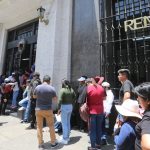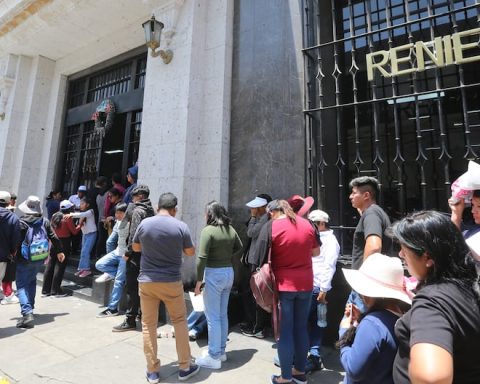The first business day after the legislative elections held the day before, in which the main opposition force prevailed in general lines and where the ruling party improved its performance compared to what it had in the PASO, reflected in the market a relatively quiet setting, in which the stock market fell 2%, While public titles marked improvements of 1% and the level of country risk fell more than 3%, piercing down the 1,700 point barrier.
The Buenos Aires stock market fell 2.06% this Monday, affected by the performance of companies in the banking and energy sector, while the ADRs of Argentine companies on Wall Street fell to 3.2%.
In the Buenos Aires market, the losses of the firms that make up the leading panel were led by Edenor (-5.33%); Transener (-4.24%); Pampa Energía (-4.13%); YPF (-4.03%); and Banco Francés (-3.98%).
In the opposite direction, the increases corresponded to Cablevisión (3.81%); Central Puerto (1.52%); Mirgor (0.61%); BYMA (0.40%); and Aluar (0.24%).
In New York, Argentine company papers ended the session with the majority of results in the red, among which stood out Edenor (-3.2%); French Bank (-3%); Globant (-2.7%); Ternium (-1.7%); and Cresud (-1.6%).
According to analysts, the decline in ADRs was influenced by the fall in the price of the dollar counted with free settlement.

The increases, on the other hand, corresponded to the Central Puerto papers (4.9%); Mercadolibre (2.3%); Banco Supervielle (0.9%); and Telecom Argentina (0.6%).
In the public debt market, dollar bonds showed an average improvement of US $ 1 along the entire curve.
On the other hand, CER-adjustable peso securities advanced 1% on average along the curve.
In this framework, the country risk fell 3.7% to 1,683 basis points.
Asked by Télam for the balance and expectations of the market post midterm elections, the chief economist of the Foundation for Development Research (FIDE), Nicolas ZeollaHe said that the uncertainty that exists on the external front “has financial and structural origins.”
“Among the financial, we have at the top of reasons: the speed and characteristics with which the maturities will be refinanced with the IMF, later on how the ruling party will face the internal agreement to attend that negotiation, and then on the pressure of investment funds that they are betting on a devaluation by raising the financial dollar, “the economist listed.
Zeolla also said that the country is at the time of year where “seasonally there are fewer dollars and the faster growth registered at the end of the year means that more dollars are demanded for production“.
“All this puts pressure on reservations. The Government has tools to manage these pressures in the power of intervention of the BCRA in the different dollars and exchange regulations, “he said.
Based on the numbers handled by the chief economist of FIDE, the real exchange rate is at high levels in historical terms of the last 5 years and the trade balance is in surplus, thus ruling out the possibility of a devaluation.
“Financial markets are often given a lot of importance, more than they have, used for political purposesespecially the blue dollar, “concluded Zeolla.
For its part, Diego Martinez Burzaco, Head of Research and Strategy at the consulting firm Inviu, told Télam that the market had already “priced” the trend of the general elections, beyond that “there were certain nuances, where at the national level the opposition was better while in the province of Buenos Aires the ruling party cut back.”
For Martínez Burzaco, the final result of the elections allowed to “decompress” the previous expectations of a negative result for the Government and this also made the bonds operate better “due to Alberto Fernández’s message that the Government is going to look for a agreement with the Fund “.
In this regard, Inviu’s head of Research and Strategy stressed that closing with the IMF “is positive because it is a necessary but not sufficient condition to guide the economic course.”
For its part, from Epyca, the consulting firm led by Martín Kalos, told Télam that the market expected a harder blow for the Government from the electorate.
“The comeback in Buenos Aires, although it was not enough to win, seemed to ease the tensions within the Government and with that it somewhat decompressed the rumors that could have been generated the day after the elections,” they assured.
Beyond this, Epyca warned that Argentine assets were reluctant to rise, with shares that even fell sharply after what seems to be a disarticulation in the aspirations for a resounding change in the economic outlook.
“The bonds did show a bit more optimistic, to the extent that the government made firm its position of wanting to vindicate itself with the country’s external creditors, and reach an agreement with the IMF,” they concluded in Epyca.

















